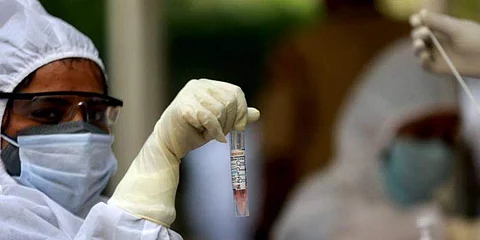

The Union Health Ministry on Monday issued a detailed action plan which the genomic surveillance consortium would follow if the new Coronavirus variant, which is more infectious, is detected in the samples of returnees from the United kingdom.
The British Government had recently announced that the newly identified strain of the virus found in their population is up to 70 per cent more transmissible. This had prompted Indian authorities to suspend flights to and from the UK till December 31.
Genome sequencing of those who tested positive after coming to India from the United Kingdom is underway to see if they are carrying the mutant strain. The Indian SARS-CoV-2 Genomics Consortium (INSACOG) has been formed to expand whole genome sequencing across the nation.
According to consortium's action plan, in case the UK variant or any other variant mutation is detected in any sample, the virus will be sent to any of the two notified COVID Virus Repositories at RCB- Faridabad or NIV, Pune for isolating the virus and further culturing.
"This can then be shared as per notified guidelines for the development of assays, which will help in the validation of diagnostics and also testing of the vaccines under development. The molecular surveillance will be closely linked with the epidemiological surveillance and clinical specimens will also be collected for relevant clinical correlations," the INSACOG said.
Further, the relevant case details, travel details, of any sample detected with the new UK variant, or any other found to be of significant from a public health perspective, will be communicated to NCDC (Director) Nodal Unit. No details shall be revealed before due approval by the competent authority.
"NCDC Nodal Unit will maintain a database of all samples of the new variants (of public health significance). The data will be epidemiologically analysed, interpreted and shared with state or district for investigation, contact tracing and planning response strategies. All the genomic sequencing data will be maintained in a National database at two sites, NIBMG, Kalyani and IGIB, New Delhi," it added.
Ten regional genome sequencing labs are — CSIR Institute of Genomics and Integrative Biology in Delhi, CSIR Centre for Cellular and Molecular Biology in Hyderabad, DBT National Institute of Biomedical Genomics near Kolkata, DBT- Institute of Life Sciences in Bhubaneswar, DBT InSTEM/NCBS in Bengaluru, DBT-Centre for DNA Fingerprinting and Diagnostics in Hyderabad.
It also includes National Institute of Virology and DBT National Centre for Cell Science in Pune, National Centre for Disease Control in Delhi and NIMHANS, National Institute of Mental Health and Neuro-Sciences in Bangalore.
According to experts, India needs to increase viral Genomic surveillance in order to understand the spread of the virus in a rapid and robust manner. In that context, the Indian SARS-CoV-2 Genomics Consortium will help to expand whole genome sequencing of SARS-CoV-2 virus across the nation, aiding understanding of how the virus spreads and evolves.
Ten regional genome sequencing laboratories spread across the country will cater to the nearest states, which will send five per cent of the positive samples to these labs for genome sequencing. The viral genome sequencing data generated by regional genome sequencing laboratories will be sent to the National Centre for Disease Control (NCDC), Delhi for collation and integration.
Over the last few weeks, the United Kingdom has faced a rapid increase in COVID-19 cases in South East England, leading to enhanced epidemiological and virological investigations. Analysis of viral genome sequence data identified that a large proportion of cases belonged to a new single phylogenetic cluster.
The new variant is defined by multiple spike protein mutations as well as mutations in the other genomic regions. Preliminary analysis in the UK suggests that this variant is significantly more transmissible than previously circulating variants, with an estimated potential to increase the reproductive number (R) by 0.4 or greater with estimated increased transmissibility of up to 70%.
However, there is no experimental evidence or indication at this point of increased infection severity associated with the aforementioned new variant. Further, few cases with the new variant have to date been also reported by Denmark, Netherlands, Australia and Belgium.
